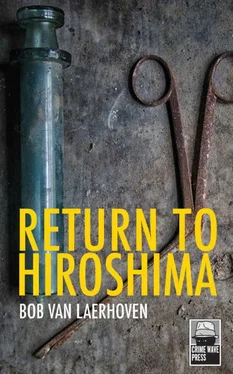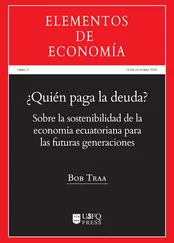“Men are strange creatures, don’t you think?” says his wife. “They’ll do anything for a woman’s body.” Is he mistaken, or is there a hint of meaning in her eyes? He takes the magazine from her. Shukan Gendai. The crumpled face of the “atom baby with the blind stare of silent suffering,” as the headline had tagged the discovery, gapes at him from the front page.
He holds the photo out to his wife. “Do you think a man did this?”
Her expression remains calm and her voice is steady when she replies: “No. When a man kills or mutilates his child, he leaves it behind at the side of the road, in a gutter, on a rubbish tip. You don’t expect paper cranes, let alone symbols like the Peace Memorial.”
Is this a concealed insult? Takeda reproaches himself for harbouring feelings of guilt. Suspicion has become second nature to him.
* * *
She bows to him, wishes him goodnight and withdraws to the bedroom. The apartment is small, but Takeda had a bed installed two years earlier in the room where he keeps his desk and computer. The computer is one of his passions. Takeda would like to wire the apartment for internet, but it’s still too expensive. In Newsweek, which he buys on a regular basis to keep up his English, he read predictions about the future potential of the net: buying books online, airline reservations, you name it. If the weekly was to be believed, the internet was set to take over the world in a decade. In a decade he would be closing in on sixty-one. Would he still be able to walk the streets, calm, conscious of his experience and inner strength, surrounded by hordes of young people who seem to be losing more and more control by the day? He was a law-abiding young man in his day, he’s sure of it. It had to do with a sense of inadequacy, of not coming up to the mark. He has clear memories of a house surrounded by trees, damp and humid – Indonesia? – and his mother pulling down his short trousers (he figures himself to be about four at the time), her hands feverishly warm, and snarling: “I should have drowned you in the shit too!” Takeda doesn’t trust the memory, although it forms the basis of the vague fear that constantly haunts him. When he was fifteen he started to blame his mother for it, albeit guardedly, and before long the distance between them was complete. Now he’s stuck with a suppressed authority problem. He not only thinks his boss is a pompous asshole, he also has uncomfortable daydreams in which he sees himself with his hands closing around commissioner Takamatsu’s windpipe. He often wonders what the buried anger towards everyone, especially his mother, is all about. When he was a teenager he saw her as closed, obstinate, but she didn’t really get in his way. In Japan she worked at first for the Dutch consulate and later for Philips Electronics. There was money enough for whatever he wanted and she was usually away most of the day, allowing him to indulge his freedom. Takeda’s Japanese friends had mothers who adored them, but tried to keep an eye on them every minute of the day. They were mummy’s boys as far as Takeda was concerned. He strutted his self-assurance for all to see, but in reality he was jealous: my son’s going to be a professor, mine an engineer.
Takeda forces himself to concentrate. Don’t lose sight of the goal. Think logically. Follow the clues. He’s expecting chief commissioner Takamatsu to hound him and his team until they produce results. The commissioner wants arrests, now not later. The identity of the suspects involved in the bank holdup isn’t his priority. The press release is what counts. Takeda gets to his feet, explores the cheap bookshelves against the wall. He would like to have more books, more space. Why has he never managed to sort them into alphabetical order? It takes a while before he finds what he looking for: Unit 731 Testimony, subtitled: Japan’s Wartime Human Experimentation Program. The book caught his attention in the American Bookshop a couple of months earlier. The English wasn’t too difficult. He’s looking for something near the front: the incident at the Teikoku Bank in 1948. Takeda reads the account carefully. The expression on his face changes from concentration to concern.
Hiroshima – Suicide Club squat – Kabe-cho – Mitsuko’s sleepless night – March 13 th/14 th1995
Igot into the habit of talking to Crow at night as if he was lying beside me. I convinced myself that his reserve had to do with his fear of my father, not because he found me ugly. When we were together, I searched obsessively for traces of aversion. I didn’t find them. Sometimes I thought I saw admiration in his eyes, and one time he said that my height impressed him. I teased him: “Does it offend your masculinity?” His smile had nothing to hide: “I’m too young to be worried about my masculinity.” He was so smart, so mature for his age. I can’t remember how often I promised myself I would ask: “Do you find me beautiful?” I didn’t dare. I started to hate my father as a result. The place in my chest that used to be filled with fear made way for rage. I dreamt of escape, with Crow, hand in hand into the big wide world, the first kiss, his fingers running through my hair. I was already familiar with his smell: leather, tobacco, a splash of the sea, and a hint of musk in the background. Fired by love and passion, that sinewy body of his would make me feel like a lady who entertains , basking in the glow of his youthful manhood.
I started to tease him more and make naughty remarks. He joined in with enthusiasm. One time we wrestled. I made sure I lost and ended up beneath him. His arms had brushed against my breasts and thighs as we wrestled. It was bliss. But he didn’t fall for it. He lay on top of me and then jumped to his feet like a puppy: “You did it on purpose! You can do a lot better, I’m sure of it! An ohimesama like you, invincible and proud.” He found it really funny and I laughed along. But in my heart I cried because he hadn’t said invincible and beautiful . I convinced myself that he wanted to say it but couldn’t, didn’t dare. When the laughter subsided he gallantly offered his hand and pulled me to my feet. At that moment I thought he was going to take me in his arms. Instead he turned around and looked at the sea. I saw the tension in his shoulders and held out my hand, but I couldn’t either . I didn’t dare.
It didn’t take long for me to convince myself that Crow didn’t take the plunge because he couldn’t set aside the class difference. The ominous shadow of my father hung between us. I didn’t blame Crow. He was still so young. The man he was going to be appeared every now and then but quickly vanished again. Our time would come.
Hiroshima – Aioi canal behind the Genbaku Dome – Beate Becht, Yori and Xavier Douterloigne – night, March 13th/14th 1995
When she’s having her period, Beate often feels as if she’s wearing a layer of hypersensitivity that makes the world chaotic. She now recognises precisely the same feeling, but this time it’s because of the young man with his backside against the bus, his hands on his knees, his head hanging forward as if he could throw up again at any moment. Stung by a poisonous jellyfish? Someone getting their own back because of a girl? She had trouble understanding his Dutch. He’s from Flanders, maybe that explains it. She asked him to speak English. She’s not quite sure what’s going on. The vinegary smell from the vomit on the ground between them only fortifies her confusion. He’s still young. Narcotics? Magic mushrooms? Possible. But tiny, poisonous jellyfish? She automatically lines up her camera and snaps a couple of shots. The boy seems groggy, clears his throat. By the time Beate hears the footsteps it’s too late. Beate is dumbstruck. The newcomer is a young woman, black tights and a short batwing coat, glossy thigh-length boots and stiletto heels. She has a mask on her chest with antennas sticking out. Her heavy breathing makes the antennas wiggle. When she catches sight of Beate she holds up both palms, clearly afraid. She’s wearing gloves made of shiny synthetic cloth. She mutters something in Japanese, realises that Beate doesn’t understand, and switches to rudimentary English: “Have Xavier Irukandji in body?” Beate says she doesn’t understand.
Читать дальше












